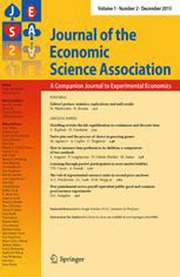Article contents
Coordination and cooperation in asymmetric commons dilemmas: a replication study
Published online by Cambridge University Press: 17 January 2025
Abstract
Janssen et al. (Exp Econ 14:547–566, 2014) studied an asymmetric, finitely repeated common-pool resource dilemma with free-form communication in which subjects made decisions about investments in an infrastructure, and about extraction from a resource made available by this infrastructure. They found that infrastructure provision and joint payoffs converged to high levels because structurally advantaged head-enders tend to behave fairly by restricting themselves voluntarily at the extraction stage, and structurally disadvantaged “tail-enders” reciprocate by investing. This paper reports a fully independent, pre-registered, double-blind replication attempt conducted in a different lab, that also supplies elevated statistical power and adheres to the highest principles of scientific transparency and openness. We find that the key results of Janssen et al. not only re-appear qualitatively but are quantitatively and statistically strengthened. The conclusions drawn from the results are therefore robust, and the basic design can be confidently used for follow-up research.
Information
- Type
- Replication Paper
- Information
- Copyright
- Copyright © The Author(s), under exclusive licence to Economic Science Association 2023.
Footnotes
This article draws on funding from the United States Department of Defense through an award to the Center of Open Science (Charlottesville, Virginia, USA) under the Defense Advanced Research Projects Agency (DARPA) program Systematizing Confidence in Open Research and Evidence (SCORE), the Deutsche Forschungsgemeinschaft (DFG) via Excellence Cluster CLICCS (EXC 2037, 390683824), and the HelmholtzGemeinschaft (HGF) via Helmholtz Energy project RESUR. The replication material for the study is available at OSF under DOI https://doi.org/10.17605/OSF.IO/4NSA5 or URL https://osf.io/4nsa5/. The author thanks Cornelia E. Neuert, the COS team, and the WISO Lab team, especially David Lucius, for valuable support. Helpful comments from the editors Maria Bigoni and Dirk Engelmann, and two anonymous reviewers are gratefully appreciated. All remaining errors are the author’s.
References
- 1
- Cited by

